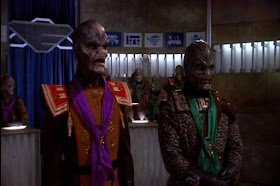“Then
from this,” said she, “and other causes which rest upon the same foundation, it
is plain that, since baseness makes men more miserable by its own nature, the
misery is brought not to the sufferer of an injustice, but to the doer thereof.
“But
the speakers in law-courts take the opposite course: they try to excite the
pity of the judges for those who have suffered any heavy or bitter wrong; but
more justly their pity would be due to those who have committed the wrong.
“These
guilty men ought to be brought, by accusers kindly rather than angry, to
justice, as patients to a doctor, that their disease of crime may be checked by
punishment. Under such an arrangement the occupation of advocates for defense
would either come to a complete standstill, or if it seemed more to the
advantage of mankind, it might turn to the work of prosecution.
“And
if the wicked too themselves might by some device look on virtue left behind
them, and if they could see that they would lay aside the squalor of vice by the
pain of punishment, and that they would gain the compensation of achieving virtue
again, they would no longer hold it punishment, but would refuse the aid of advocates
for their defense, and would entrust themselves unreservedly to their accusers
and their judges.
“In
this way there would be no place left for hatred among wise men. For who but
the most foolish would hate good men? And there is no cause to hate bad men.
Vice is as a disease of the mind, just as feebleness shows ill health in the
body. As, then, we should never think that those, who are sick in the body, deserve
hatred, so are those, whose minds are oppressed by a fiercer disease than
feebleness, namely wickedness, much more worthy of pity than of persecution.”
—from
Book 4, Prose 4
I am
wary of presenting a passage like this, because it will all soon degrade into a
fight about the petty politics of justice. One man will tell me that we are too
easy on criminals, that we must punish them more severely. Another man will
tell me that we have no heart, that we must reform rather than inflict any
suffering.
The one
man says he loves the victim, and demands a harsh repayment from the offender.
The other man says he loves the offender, and demands complete forgiveness
from the victim.
And
these two combatants will duke it out, and the hatred they have for one another
will overshadow the original question. It will become a battle of the tribes,
the red versus the blue in modern America, or the blue versus the green in
Constantinople, or the green Drazi versus the purple Drazi on Babylon 5.
The
limitations of labels will become apparent when we look beyond the party lines,
and we turn instead to a deeper philosophy. Yes, embrace both punishment and
compassion. Be just to them all, and love them all, because any justice or love
that is preferential will never be justice or love at all. There can be no
opposition here, but only a harmony between both. Justice is an expression of love,
and love is the source of justice.
Pay the
price that you must pay, balance out those scales, and then there is a chance for both
compensation and reformation. Give back what you have unjustly taken, and then
you have the opportunity to both make the wrong right and to redeem yourself.
Might the punishment need to be harsh? Perhaps. Must the motive always be love?
Absolutely.
If I
have done wrong it is from my own choice, but my vice is still a sickness of
ignorance and poor habits. A sick man requires a doctor, not another man who
inflicts another round of hatred upon him. Will the cure be painful? It most
often is. Will it be worth the cost? Most certainly.
Me
versus you? No. All of us together? Yes.
Lawyers
and judges get a bad rap, but not because there is anything wrong with the
practice of law itself. There is, rather, something wrong with the way a good
number of them go about interpreting the law. Many assume that it must be
confrontational, and from manipulating this confrontation they make their own
profits, winning their ill-gained fame and fortune.
One man
wins, and another man loses; it never occurs to them that all men should win.
This side has succeeded, and that side has failed; it never occurs to them all
sides can succeed.
How
might I help a wicked fellow come to recognize what he has done, and who he
might still become? How might I help a poor fellow, who has been dragged in the
dirt, recognize that he can still reach out a merciful hand? That is justice,
as Nature intended.
It is a
difficult goal, but it is not an impossible one. It is far less ridiculous than
assuming we can make life better for one half by destroying the other half.
My
resentment comes from thinking I have been wronged, and my hatred comes from
lashing out against that perceived wrong. Now I am no better than what I
condemn. Nature, and Nature’s God, do their work by healing, not by
condemnation.
Bring
out physicians for the soul, not executioners of the spirit.

No comments:
Post a Comment